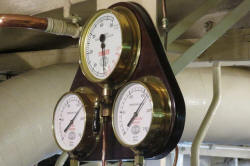Strand 1: Asking questions, listening to answers

You arrived here because you agreed or fully agreed with one of these statements:
I usually already know the answer to the questions I ask because I am asking them to find out how much they understand
I listen very carefully when my students talk to me to make sure they are getting the language right
Read through these examples of snippets from
classroom interactions. What do you notice?
Click here for some comments when you have thought a little.
|
T:
What city is the main subject of the text? S: Paris. T: Right. Does the writer like it? S: He loves it! T: Excellent |
T:
What city is the main subject of the text? S: Paris. T: Right. Does the writer like it? S: He loves it! T: Have you been there? S: Yes, once. T: Do you have the same feeling as the writer? |
|
T:
What tenses do the writers use in the story? S: Past most but some present like "He jumps up." T: Good. Why do the writers use the present in a story about the past? S: It makes it .... err ... dramatic. T: Fine. |
T:
What tenses do the writers use in the story? S: Past most but some present like "He jumps up." T: Good. How does 'He jumps up.' make you feel. Is it different from 'He jumped up.'? S: It seems more strong. T: Mmm. It does, doesn't it? Did you enjoy the story? |
Here are some comments:
- All four of these exchanges are typical of what happens in classrooms all over the world. They have in common, incidentally, the fact that the teacher is doing all the initiation and the learner is doing all the responding and that's a problem we'll come to.
- On the left, however, the teacher clearly knows the answer to all the questions before they are asked and the student only has to display the right knowledge. This means that the learner knows that the teacher is testing not really asking proper questions and will only listen to the answer to check if the information is right.
- On the right, on the other hand, the teacher knows the answer to some of the questions but clearly does not know how the learner feels when reading the text or whether she/he has the same feeling about Paris as the writer had. These are real questions which means the teacher is listening to the content of what the learner says.
 |
So what? |
Good question. Any answers? Click here when you have.
Here are some comments:
- Authenticity
- If it is our avowed aim to improve our learners' communicative competence in the real world, then it seems logical, as often as we can, to make interactions inside the classroom simulate those they might encounter outside the classroom.
- Motivation
- Most of us actually like someone to ask us about our feelings and experiences because it makes us feel valued and interesting. That's a strong motivating factor.
- Skills authenticity
- We react to texts of different sorts in different ways and read them using different strategies. If a text is only used as a vehicle for language work, we won't be giving our students the chance to react to texts personally and authentically.
- Learning
- Language is more memorable if we have had some kind of personal connection to it and engaged parts of our personalities rather than only our analytic skills.
 |
The other problem |
We saw above that the other problem with the teaching exchanges was
that it is always the teacher who does the initiation and the student is
consigned to the role of responder. (For more
on Initiation, Response, Feedback routines, see
the guide to speaking.)
Why should this be a problem?
Click here when you have had some
thoughts.
Some comments:
- Authenticity
- In the real world, we share our initiations and responses more fairly and usually, as you may have seen if you followed the guide to speaking, we respond and initiate in the same turn. That's not happening in the interactions above so the learner is getting one-sided practice.
- Commitment and autonomy
- If the learners are not given the opportunity to initiate as well as respond, they are forced into a receptive and passive role which doesn't allow for full commitment to what's going on in the room. It also leaves the learner unable to function independently.
- Communicative skill
- If learners get too little training in how to (and in the
need to) initiate to keep interactions flowing, then we'll end
up with the usual sorts of conversations such as:
A: Where have you been this evening?
B: I went to the cinema.
A: What did you see?
B: A film.
A: Oh. [end of conversation]
instead of:
A: Where have you been this evening.
B: I went to the cinema. What have you been doing?
A: That's nice. Oh, I've just been out for a walk with Rover. Was it a good film?
B: Not really. Did you go to the park?
etc.
which may not be particularly gripping but is a bit more like real people-talk.
 |
Developing the skills of asking the right questions and having the right people ask them |
This really isn't too difficult. Here are two proposals for short, simple development programmes to encourage you to use real questions in class as well as the other sort (which are, indeed, sometimes very helpful) and to get your students to initiate more.
 |
Proposal 1 |

Record a lesson or get an observer to watch and note down all the
questions that you ask during the lesson. Make a list of them.

Now divide the list into two columns: real
questions (to which you didn't already know the answer) and questions
asking students to display their knowledge to you and the class.

Make a new plan for the next lesson in that
series or on that topic inserting real questions at least once between
each display question. Try to keep the lesson format similar.

Teach that lesson and see if student
commitment rises.

Canvass the views of the learners about which
lesson they enjoyed most and which one they can remember best.
 |
Proposal 2 |

Record a lesson, replay it and note down all
the times someone initiated during the lesson. Make a list of what
the initiations were.

Now divide the list into two columns:
initiations from you and initiations from the learners.

Now follow steps 1 and 2 to make a list of
all the responses and who did the responding.

Make a new plan for the next lesson in that
series or on that topic. This time, insert procedures where the
learners must
initiate.
Make sure there are also one or two occasions when they must initiate
and you must respond. Try to keep the lesson format similar.

Teach that lesson and see if student
commitment rises and they are more active.

Canvass the views of the learners about which
lesson they enjoyed most and which one they can remember best.
For proposal 2, it may be helpful to look at the guide to teaching speaking.
 |
Gauging progress |
There's a separate guide in this section of the site to
gauging and measuring progress in your
development. Go there for more ideas.
In terms of asking questions and listening to answers, you may not
be the best judge so, if you can, get someone to observe how you pose
and react
to questions and ideas and discuss whether your question or reaction was the right one.
If it wasn't, try to think together about what would have been the right
questions and the right response.
